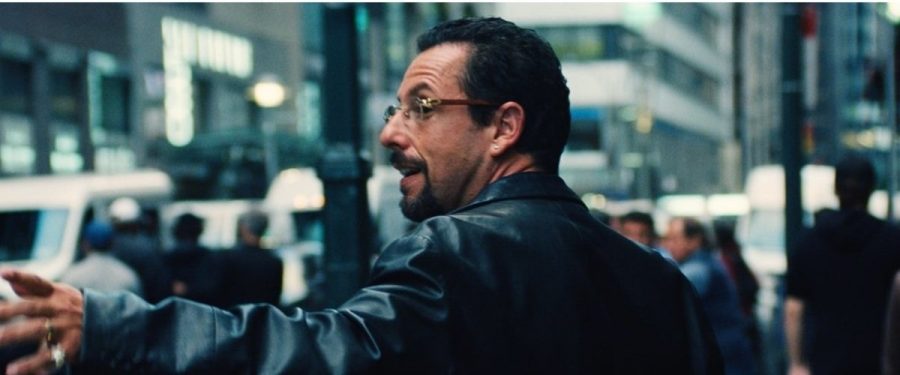Headphoning it In: “Uncut Gems” Reimagined
March 27, 2020
Reflecting on a time when movie theaters were still open, I have spent a substantial amount of my free time thinking about a film I saw earlier this year, Uncut Gems. Following their previous hit Good Time, visionary brothers Josh and Benny Safdie collaborated once more with production enterprise A24 for this action-thriller hit. Adam Sandler plays New Yorker Howard Ratner who has gambled his way into dangerous financial debt. Howard is a well-respected jeweler who comes into possession of a black opal, uncut of course, which becomes the fixation of basketball player Kevin Garnett. The film follows Howard’s entangled lies, bets, and drama fueled by empty promises and executed threats. The world building is beyond phenomenal and watching Uncut Gems is no short of an out of body experience. Known for their chaotic, high energy, anxiety-provoking filmmaking, the Safdie brothers undoubtedly deliver on all cylinders. While tension builds within the trailer, the movie itself throws all preconceptions out the window, delivering an entangled mess that leaves the audience begging for more. I went into my viewing experience expecting to enjoy yet another A24 classic, and left the theater furious that Adam Sandler did not get an Oscar nomination (a sentence I still have trouble reckoning with). While this movie would feel entirely incomplete without Daniel Lopatin’s spacy, hypnotic score, I present my own playlist for the best film thus far of 2020.
“Thos Moser” by Gupi, featuring Fraxiom, can only be described as the auditory form of the inundating waves of emotion you experience while watching Uncut Gems. This song is an electronic nightmare; like the addictive inability to look away from a car crash, once you have started listening to “Thos Moser,” it’s practically impossible to stop. Much like the genius dialogues within Uncut Gems, the song sounds like a host of simultaneous conversations, a back and forth between four different songs in one. Severely autotuned vocals atop of discordant synths amplify the track’s claustrophobic quality.
New York as a setting is incredibly influential in Uncut Gems, acting like a character in itself. Harlem rapper Big L’s “Don’t Sleep” embodies the looming threat of the city, and all that it stands for, within the film. The track is gritty, yet the record player crackling and rhythmic chimes throughout the beat add structure to an otherwise harsh song. While the movie is set in 2012, the characters hold a timeless essence which bridges together the old school with the contemporary. The Safdie brothers, being native New Yorkers, were surely inspired by the imagery in 90s rap to stick to exploring the darker sides of a picture perfect city.
The screeching electric guitar and pounding electronic synths ground DEVO’s “Turn Around” in a chaotic reality. The incessant beat is reminiscent of the ceaseless urban frontier, where business and pleasure always intermix and never stop for anything. Yet, it’s only when Howard is forced to reckon with his debts, his lies, and his cheating does he get a deeper understanding of the empire he’s built for himself, one where even if he wins big money, he will always be at a loss, unable to turn around his life for the better. This song is the perfect embodiment of the entire film, where a highly energetic background works to disguise candid lyrics about society’s less than ideal truths.
The Safdie brothers play with the duality of noise, employing both excessive noise and uncomfortable silence in Uncut Gems’ most memorable scenes. In the moments of silence, when all other sounds are muted, true mastery shines through. Likewise, on Led Zeppelin’s “Heartbreaker,” Robert Plant’s signature wails only go silent for an unbelievably iconic Jimmy Page guitar solo. Howard himself is a heartbreaker due to his endless shortcomings: his addition to gambling, disregard for money, failing romantic relationships, the façade of his entire brand.
This high energy track mirrors the heart-pounding moments where Howard’s entire fate hangs in the balance of one wrong decision, and is a personal classic rock favorite.
“Mortal Projections” by Djo is a psychedelic masterpiece layered with dreamlike vocals. The lyrics echo the sentiments of a heartfelt exchange, discussing the misalignment between dreams and realities. The haunting synths and curious bass line are just two features of this song’s exquisite production. The final line, “I see reflections of my mortal self projected on the wall,” is much like the titular uncut gem of which the power in both the reality and the figments of imagination are brought together.
There is a scene in Uncut Gems where Howard is driving home with his wife and children. In the background of layered dialogue, an inattentive, anxious Howard listens to an oldies radio station when “The Stranger” by Billy Joel comes on. It is a touching and memorable both for its brevity and normalcy, and is the last scene before the third act without extreme tension and insanity. This melancholic pop-rock anthem is beautiful in its storytelling ability, especially since the track is sandwiched between a minute of calming piano playing and whistling at its beginning and end. Howard’s ambiguous nature reveals the pretense of his self-assured ways as he realizes, over the course of the film, that he is a stranger not only to himself, but also to everyone he interacts with.
I would be remiss not to mention The Weeknd or his newest album, “After Hours.” The R&B singer has a cameo playing the 2012 version of himself in the film, and even brawls with Adam Sandler in the most unexpected match-up of the year. “Until I Bleed Out” is the album’s melancholic closure. The brooding bass echoes underneath The Weeknd’s harmonies before fizzling out like a dying star. The introspective track signifies the end of a journey, reflective of Uncut Gems’ own ending, marked by fear, torment, and aggression.















